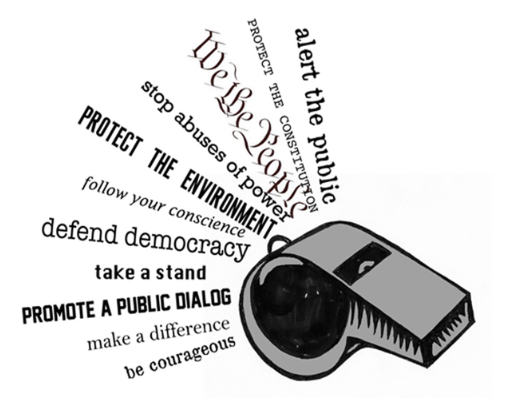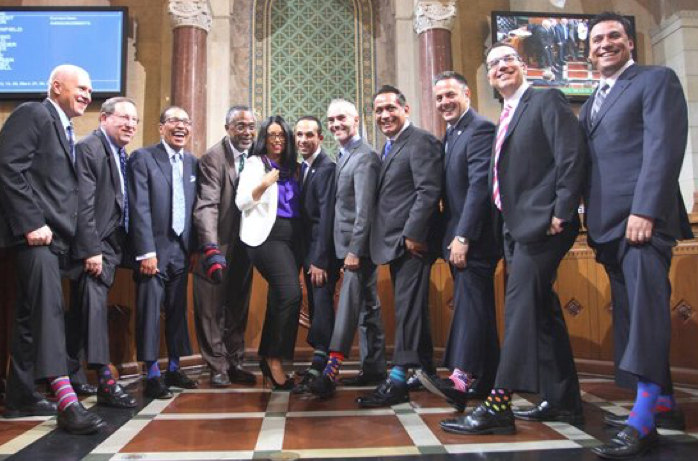CommentsPLANNING WATCH-370 current and former City of Los Angeles employees have signed an open letter to Mayor Eric Garcetti and the City Council.
They wrote, “We envision a future where community safety and security is provided through secure housing, education, food security, and healthcare, not over-policing.” Published in CityWatch on July 2, 2020, this letter is important for at least two reasons.
First, it garnered supporters from 29 separate City departments, an indication that City employees, who provide much of LA’s vital infrastructure and public services, truly care about LA’s residents, not just well-connected real estate investors. Isn’t a working alliance between the providers and consumers of municipal services a logical next step? In fact, such a working labor-neighbor model already exists. In the recent LA teachers strike, their union, United Teachers of Los Angeles (UTLA), cultivated and received significant support from their students’ parents.
Second, the authors of the Concerned City Employees letter allowed signers to substitute an initial for their last name. So far seventy-two (72) signatories accepted this offer. I assume that they realized that the Mayor’s taking a knee with demonstrators was a de-escalation technique, not a sign of fundamental City Hall policy changes. Presumably they feared retribution and recognized that the Mayor’s proposals to reduce LAPD funding from 54 to 49 percent of the City’s budget was a tactical retreat, not a long-term pull back from City Hall’s highest priorities, policing and real estate speculation.
The letter cited this concern, “We, as City employees, chose to do this work in the public sector because we believe in the power of our labor for social good. We are asking you, as our elected leadership, to join this urgent moral call to action and reimagine with us.”
Since the letter first circulated, on June 25, 2020, the City Council has yet to adopt any of its proposals, abridged below:
- “REINVEST: Reallocate funds to essential social services . . . Top priorities include low-income housing assistance and rent cancellation, alternatives to public safety, mental health support, food assistance, and free public transportation. . .;
- RELEASE: Investigate any LAPD officer who has been accused of using unreasonable, excessive, and/or deadly force. . .;
- RESPOND: . . .Adequate (Covid-19) testing, small business protections, and safe housing during the pandemic. . .;
- REBUILD: . . . Partner with community members to implement these budget priorities across City departments. . .including a participatory budgeting process for all future budgets.”
Like other CityWatch writers, I have devoted many columns to unravel how City Hall boosts social and economic inequality in Los Angeles. I, therefore, hope that Concerned City Employees will carefully scrutinize the work programs of the 29 City Departments they represent to continue this work. In particular, I look to the signers who work for my former employer, the Department of City Planning. They make-up one-third of those who signed the letter, and they are in position to identify zoning and planning laws, regulations, decisions, and practices that contribute to LA’s declining quality of life. After all, the Planning Department plays a strategic role in facilitating LA’s housing crisis, deteriorating infrastructure, and mediocre public services. These problems result from deliberate decisions, many of them spelled out in the files that LA’s planners poor over day-after-day.
Whistle Blowing: Like previous generations, many of these young city planners chose their profession so they could advance such goals as social equity. But, once at work, they quickly learned that mammon, not mass movements, played an outsized role in their professional advancement. This hardly means, however, that young, idealistic planners cannot make other contributions. Many decades ago, the late California State Senator and political organizer, Tom Hayden, explained how municipal city planners could use their job-related knowledge to become whistle blowers. When they learned of a plan, zoning waiver, or major project that would harm a city’s residents, he said they should quietly let the impacted communities know. Since then, new social media have created many more outlets for this type of public service. Information can be safely shared via email or posted to websites, Twitter, Instagram, and Facebook. For that matter, whistle blowers can write articles under pseudonyms and anonymously submit tips to reporters at newspapers and radio/TV stations.

If they are not sure where to focus their whistle blowing, Los Angeles is awash in gentrification. It appears as rent increases, evictions, and residential demolitions. The new, replacement housing is invariably expensive and leads to more homelessness. Many articles explaining these processes, as well as outright City Hall corruption over major real estate projects, are readily available at the CityWatch archives. Like other CityWatch writers, I also welcome questions and comments on City Hall sleaze and the alternatives that ought to be implemented.
For those not sure where to share their insider information, here are a few organizations that you can contact, and there are many more.
United Neighborhoods for Los Angeles - UN4LA ([email protected])
Coalition for Economic Survival – CES ([email protected])
Los Angeles Tenants Union ([email protected])
Livable California ([email protected])
Fix the City (Twitter: @FixTheCityLA)
A cautionary note: We live in an era where bad actors have a fast learning curve. They have figured out how to wrap their neo-liberal agenda, especially environmental and zoning deregulation, in an anti-racist veneer. Hence, well-funded astroturf organizations claim, despite overwhelming evidence to the contrary, that if cities would up-zone privately owned parcels, real estate investors could then build their way to racial equality. Just remember to ignore those windfall profits piling up behind the curtain, as well as the new apartments whose rent is far beyond the reach of most prospective tenants.
Above I asked what would Concerned City Employees do next? Will they pursue the police and non-police issues they raised in their letter? Will they take stock of their own City Departments? Will they become clandestine City Hall whistleblowers? Will they form a labor-neighbor alliance? Once they take these next steps, they can improve the lives of millions of Angelenos, but it will not be easy. It will demand long-term follow-up to their courageous letter.
The Mayor, the City Council, and the public all deserve their continued attention.
(Dick Platkin is a former Los Angeles city planner who reports on local planning issues for CityWatch. He serves on the board of United Neighborhoods for Los Angeles (UN4LA) and is co-chair of the new Greater Fairfax Residents Association. Please email comments and corrections to [email protected] or via Twitter to @DickPlatkin.) Prepped for CityWatch by Linda Abrams.















